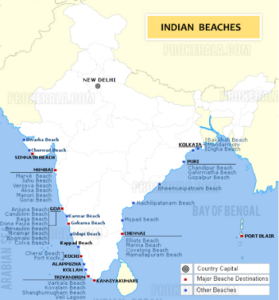In news- Recently, two Indian beaches –Kovalam in Tamil Nadu and Eden in Pondicherry beaches have received Blue Flag Certification, with the total count reaching ten.
Key updates-
- Kovalam Beach also known as Covelong is known to provide the perfect ambience for “surfing”, and is known to be one of the few spots in the eastern coast where “windsurfing” is frequently undertaken.
- Eden Beach in Chinna Veerampattinam near Puducherry has become the first beach in the Union Territory to get the coveted ‘Blue Flag’ certification.

Recertification for 8 beaches
Foundation for Environment Education in Denmark (FEE) which accords the globally recognized eco-label – Blue Flag certification, has also given re-certification for 8 nominated beaches Shivrajpur-Gujarat, Ghoghla-Diu, Kasarkod and Padubidri-Karnataka, Kappad-Kerala, Rushikonda- Andhra Pradesh, Golden-Odisha and Radhanagar- Andaman and Nicobar, which were awarded the Blue Flag certificate last year.
About Blue Flag Certification-
- The Blue Flag beach is an eco-tourism model endeavouring to provide the tourists/beachgoers clean and hygienic bathing water, facilities, a safe and healthy environment and sustainable development of the area.
- It is accorded by the international jury composed of eminent members – United Nations Environment Programme(UNEP), United Nations World Tourism Organisation (UNWTO), Denmark-based NGO Foundation for Environmental Education (FEE) and International Union for Conservation of Nature (IUCN).
- The Foundation for Environmental Education(FEE), a non-profit organization from Denmark conducts regular monitoring & audits for strict compliance of the 33 criteria at all times.
- It started in France in 1985 and has been implemented in Europe since 1987 and in areas outside Europe since 2001, when South Africa joined.
- The Blue Flag is sought for beaches, marinas, and sustainable boating tourism operators as an indication of their high environmental and quality standards.
- A waving “Blue Flag” is an indication of 100% compliance to these 33 stringent criteria and sound health of the beach.
- The Blue Flag Programme for beaches and marinas is run by the international, non-governmental, non-profit organisation FEE (the Foundation for Environmental Education).
- It started in France in 1985 and has been implemented in Europe since 1987 and in areas outside Europe since 2001, when South Africa joined.
- At present Japan and South Korea are the only countries in South and southeastern Asia to have Blue Flag beaches.
- Spain tops the list followed by Greece and France.
- The Blue Flag is sought for beaches, marinas, and sustainable boating tourism operators as an indication of their high environmental and quality standards.
- The certification includes standards for quality, safety, environmental education and information, the provision of services and general environmental management criteria.
- There are nearly 33 criteria that have to be met to qualify for a Blue Flag certification.
- Some criteria are voluntary and some compulsory.
- Indian beaches and Blue flag certification:
- Recently centre issued an Extraordinary Gazette Notification declaring a list of activities and facilities that would be permissible in the Coastal Regulation Zone (CRZ) areas of certain beaches, including Islands, subject to maintaining a minimum distance of 10 meters from the High Tide Line (HTL) which have been identified for obtaining the ‘Blue Flag’ certification.
- The Indian beaches are being developed by the Society for Integrated Coastal Management (SICOM), an environment ministry’s body working for the management of coastal areas, according to the Blue Flag certification standards.
- Chandrabhaga beach on the Konark coast of Odisha became the first in Asia to get the Blue Flag certification in 2018.
I-AM- SAVING-MY-BEACH
India had started its journey of sustainable development of coastal regions on World Environment Day in June 2018 by launching its beach cleaning campaign – I-AM- SAVING-MY-BEACH simultaneously at 13 coastal states and thereafter implementing the ministry’s coveted programme Beach Environment and Aesthetics Management Services (BEAMS).
Beach Environment & Aesthetics Management Services (BEAMS) initiative
- MoEF&CC in its pursuit of “Sustainable Development” of the coastal regions of India embarked upon a highly acclaimed & flagship program BEAMS
- It is one of the initiatives under Integrated coastal zone management (ICZM) approach that the MoEF&CC has undertaken for the sustainable development of coastal regions of India, with a prime objective to protect and conserve the pristine coastal and marine ecosystems through holistic management of the resources.
- This was aimed for achieving the globally recognized and the coveted International eco-label “Blue Flag”.
The objective of BEAMS program is to
- Abate pollution in coastal waters.
- Promote sustainable development of beach facilities.
- Protect & conserve coastal ecosystems & natural resources.
- Seriously challenge local authorities & stakeholders to strive and maintain high standards of cleanliness, hygiene & safety for beachgoers in accordance with coastal environment & regulations.
















